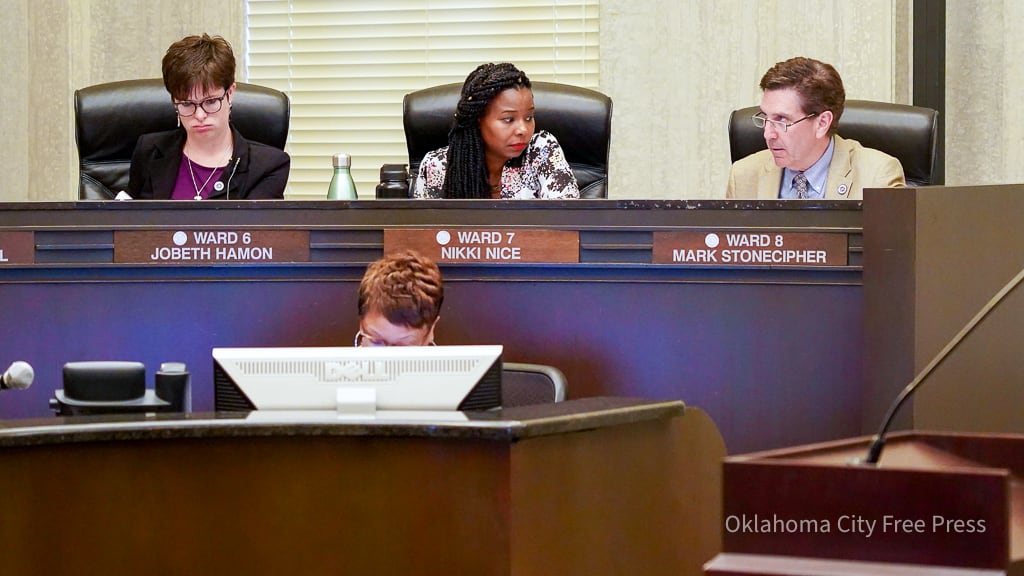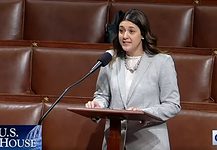Last Updated on November 29, 2022, 7:32 PM | Published: November 29, 2022
When he proposed two anti-homeless ordinances that would effectively criminalize poverty, Ward 8 councilmember Mark Stonecipher performed a sinister cover version of Rudolf Giuliani’s jackbooted anti-homeless campaign in 1990s New York City.
On Nov. 22, Stonecipher gave such an unwelcome performance of this old authoritarian chestnut that Oklahoma City citizens turned out in droves to condemn the proposals. Oklahoma City Mayor David Holt said he would vote against them, and nearly everyone gathered around the horseshoe who was not named Robert or Carol Hefner thought Stonecipher should check his humanity.
The stench from Stonecipher’s proposals was so overpowering that the Oklahoma City Council voted unanimously to strike the ordinances.
The two proposals included a trespassing ordinance that would force individuals to provide written proof that they were authorized in a public or private space, and an anti-encampment ordinance that would allow police to break down and disperse homeless camps.
Both were redolent of Giuliani’s reign of terror over New York City’s unhoused population.
Republished in partnership with Oklahoma Voice under Creative Commons license CC BY-NC-ND 4.0. Oklahoma Voice is a part of States Newsroom which is a nonprofit news network supported by grants and a coalition of donors as a 501c(3) public charity. Oklahoma Voice maintains editorial independence. Contact Editor Janelle Stecklein for questions: [email protected]. Follow Oklahoma Voice on Facebook and Twitter.

Giuliani is now mostly joke material, but as the 107th mayor of New York City, he forced people out of homeless shelters after 90 days and sent New York Police Department officers to break up homeless camps in public spaces and arrest them. On a 1998 visit to New York, I saw art for sale in Central Park – something Giuliani also wanted to ban – depicting the mayor with a Hitler mustache.
Stonecipher’s proposals were seemingly cribbed from Giuliani’s policies, in which people were often arrested for sitting on their own stoops, because they could not readily prove they lived there. But bad ideas have a way of staying around, especially if they are part of a bad-faith plan to just hide the homeless from being seen by people of privilege.
The councilmember wrapped his ordinances in sheep’s clothing, asking whether it was humane to allow unhoused people to die from freezing rather than keep them in the Oklahoma County Detention Center (OCDC). But no unhoused people have died in Oklahoma City in the past two years due to weather. Meanwhile, on Nov. 19, 57-year-old Renee Houston became the 15th person this year to die in OCDC custody.
Arguably, Stonecipher’s ordinances would result in more such deaths. An influx of unhoused people in the OCDC would overburden an already catastrophically failed facility and would place people whose only crime was homelessness in close quarters with violent offenders.
In his cover letter, Stonecipher cited similar ordinances that were approved in San Diego, California, as being successful. But San Diego’s homeless numbers never experienced a meaningful shift, since moving the unhoused created a mirage of effectiveness. It gave the impression that Stonecipher’s goal was not to help the homeless, but to simply not see them.
The week before Stonecipher’s Waterloo, I attended Ward 2 councilmember James Cooper’s kickoff to his own reelection campaign. Cooper spoke passionately about the need for substantive and meaningful change in how Oklahoma City addresses homelessness. He cited Houston, Texas’ successful program to house the unhoused, investing $200 million in relocating homeless individuals into one-bedroom apartments.
This is roughly 1/220th the amount of money Elon Musk spent buying Twitter.
Rather than criminalize poverty, Cooper wants to emulate a program that reduced Houston homelessness by 19 percent in two years and 64 percent since 2011. In January 2022, Houston Mayor Sylvester Turner announced a $100 million plan to cut the current homeless numbers by half.
What worked in Houston can work in Oklahoma City, but with the city currently facing an affordable housing shortage, the hill is steeper to climb. It will require investment, hard work, outreach and above all, year-round focus on people’s needs rather than short-sighted, Trumpian initiatives that punch down on the dispossessed.
Oklahoma City turned out to decry Stonecipher’s proposals, which means there is the will for the kind of change that could transform the lives of the 1,339 people who were counted as homeless in this year’s Point in Time Count.
George Lang has worked as an award-winning professional journalist in Oklahoma City for over 25 years and is the professional opinion columnist for Free Press. His work has been published in a number of local publications covering a wide range of subjects including politics, media, entertainment and others. George lives in Oklahoma City with his wife and son.











